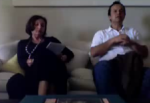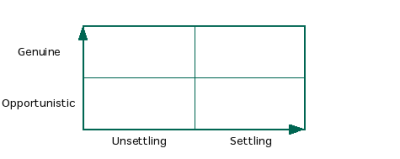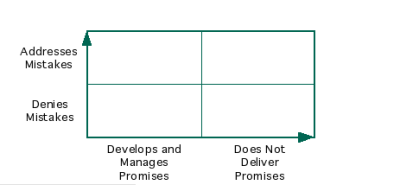Worldzenship
This blog explores our increasingly networked world and how this phenomenon is changing our understanding of freedom, solidarity, or citizenship.
February 13, 2007
Poorly Predicting Happiness
Check out this post about Dan Gilbert, a professor of Psychology at Harvard. Steve's post contains a link to a video of the professor illustrating how human beings are poor predictors of their own happiness. Also, take some time to explore the TED website. There are some very interesting conversations happening in this group.January 9, 2007
Conversations with Atina Chile
Below are two video clips of conversations I had with members of Atina Chile, coordinated by Gloria Letelier.

December 3, 2006
An Open Source Journalism Experiment
Jay Rosen, an Associate Professor of Journalism of NYU, spoke recently at the Berkman Center for Internet and Society about his new project, NewAssignment.net.NewAssignment.net is an experiment about how to build the community, roles, and practices of Open Source Journalism. How do you build this "game"? What are the rules? How can the players win?
I am exploring two categories of Rosen's questions: the players' concerns, and commitment.
- Rosen has questions about the division of labor for all the different people coming into Open Source Journalism who have different concerns. How do we understand the concerns (what they call motivations) of the different players: professional journalists, freelancers, amateurs for no pay, people trying to become journalists and make a name for themselves?
- Rosen talks about building some sort of hierarchial structure in this collective in which there will be editors who set deadlines. And the deadlines are part of the incentive to keep writers going. He discusses how certain writers will be preferred based on their commitment to the deadlines and their know-how to write good stories. He mentions tracking the commitments of the reporters as a possible step forward. He also opens up the question of how to track the assertions of the stories: How do you rate the data that people use? How do you build a structure to fact-check
All of this is new and Rosen says his goal of this experiment is to see what new knowledge can come from it. What can we learn? As he opened these questions, I would like to do the same here. How do we understand what is happening at NewAssignment.net and how can we collectively move here to produce an interesting and valuable collective?
November 8, 2006
Assessing Political Patterns
The main incentives in current political practices run in the opposite direction from dealing constructively with dying collectives, such as the oil industry we highlighted in the previous post. The overwhelming majority of politicians organize their discourses and platforms targeting the “average” voter, so that they can capture their votes. However, the technology for simply capturing votes is neither conducive to major innovations in social practices, nor with displacing obsolete collectives. It is conducive to stagnation.To help think about this problem,we have created a few criteria to segment politicians, other than by-partisanship. We have defined two axes. The first axis goes from the extreme of marketing oriented politicians that organize themselves to meet the average “mindset” of the voters, to the other extreme in which the politicians organize themselves to destabilize the current dominant “mindset.” In other words, politicians that settle their audiences in an already obsolete average understanding of situations, and politicians that unsettle their audiences freeing them or making them potentially open to previously unavailable futures.
The second axis goes from politicians that are hyper-adaptive to circumstances so they reorganize their point of view and commitments based in their individual opportunities to gain political power at one end to the other extreme in which politicians that have a core set of values and concerns that constrain the way in which adaptive moves and evolution may unfold at the other.

Of course, what is being unsettled or what constitutes a genuine ethical evolution are very challenging assessments that will be controversial and will require practical engagement with real situations. These axes, settling-unsettling and opportunistic-genuine, may be useful to assess the historical leadership of a particular politician.
To assess the operational execution of a politician we propose a different pair of axes. The first axis runs from politicians that do not manage her/his the promises to her/his constituencies to the opposite pole of politicians that do manage her/his promises to her/his constituencies. At the latter pole, s/he is a politician that is able to address the evolving concerns of her/his constituencies making clear promises, and delivering them.
The second axis is about their capacity to handle and learn from breakdowns and mistakes. In one extreme is the official that denies mistakes and on the opposite side is the one that addresses, take responsibility, repairs damage and learns from mistakes.
